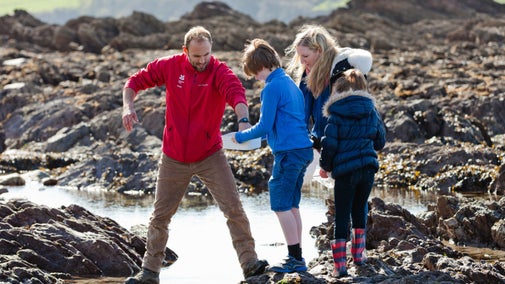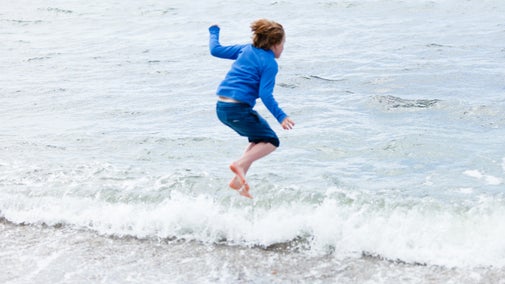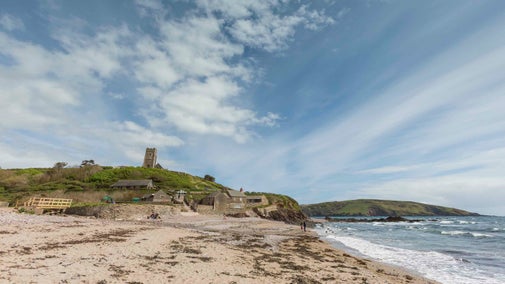
Become a member
Join today and help protect nature, beauty and history – for everyone, for ever. Enjoy access to more than 500 places with National Trust membership.
A spectacular stretch of coastline boasting dramatic cliffs, diverse wildlife and a beach renowned for rockpooling
Wembury Beach, Wembury, Devon, PL9 0HP

| Asset | Opening time |
|---|---|
| Countryside | Dawn - Dusk |
| Old Mill Café | 11:00 - 16:00 |
| Marine Centre | Closed |
The Old Mill Café is closed on Christmas Eve and Christmas Day. Wembury Marine Centre is closed during the Christmas holidays.
The Old Mill Café is open for hot drinks and light meals. The café is accessed via a stepped slope and eight steps, but staff are on hand to help with access when needed. For up-to-date opening hours, please call 01752 863280. Please note that the café is owned but not managed by the National Trust.
Option to pay or verify membership by using the car park machines or a digital payment system via the JustPark app, using codes 80704 (Wembury Beach) and 80705 (Wembury Point). We recommend setting up and downloading the app before your visit. Parking is free for members and for non-members it's £6 February - October (£3 after 4pm) or £3 November - January.
Car park - more informationBetween 1 October - 30 April, Wembury Beach is dog-friendly. Please note that dogs are not allowed on the beach between 1May - 30 September. Dogs are welcome on other walks around Wembury. Please keep them under close control around cattle and ponies or on a lead around sheep.
Toilets are available but please note they are only accessible via steps at present. An outdoor shower is also available. There is an accessible toilet in the Wembury Marine Centre which is open 7 days a week, 10am-4pm.
Toilet - more informationSteps to beach. Accessible toilet in Marine Centre (when open). Blue badge parking. Level access circular walk at Wembury Point.
Designated places for Blue Badge holders. Parking is free for Blue Badge holders.
Benches and seating is available around the site.
Terrain is mostly uneven.

Discover some top tips for an enjoyable and safe visit to Wembury Beach.

Find out about visiting Wembury with your dog, from where you can and can’t take them, to the facilities available for dog owners. Wembury is a one pawprint rated place.

Sandy/pebbly main beach and smaller coves accessed from the coast path towards Wembury Point.
Miles of coast accessed from the coast path. Ocean and inland views from Heybrook Bay to the River Yealm.
A mill has been here since the 12th century. The existing building is over 150 years old. Now a café.
Run by Devon Wildlife the Marine Centre has displays about the local sealife and runs regular events.

Stay as close to the beach as possible in this old mill conversion right on the edge of Wembury.

From water sports on the beach to rock-pooling with the family, discover the adventures to be had when you visit Wembury and the surrounding areas.

A lovely walk all year round, starting from Warren, about 10 miles from Wembury, with far-reaching coastal views, woodland leading right down to the estuary edge and the beautiful village of Noss Mayo.

This clifftop walk down to a picturesque viewpoint offers dramatic vistas and a chance to spot rare birds and marine life – especially if you bring your binoculars.

Follow this moderate coastal walk via a wildlife-rich Site of Special Scientific Interest and the former HMS Cambridge base, before looping back for views of the Great Mewstone.

A 3-mile (4.8km) challenging circular route, with country and coastal views, follows smugglers' lanes down to a secluded cove, accessible only on foot or by boat, and returns through fields.

A strenuous but rewarding walk round the wilder side of the Yealm estuary, from Gara Point to Noss Mayo, taking in a combination of Victorian history and wildlife along the way.

Enjoy a short, gentle walk through picturesque farmland with impressive views of Bigbury and Burgh Island and a chance to spot rare birds and flowers.

Follow this coastal route to historic Gunrow Signal Station for panoramic views and a great picnic spot. Then head back over Netton Down, looking out for marine life below.

This clifftop walk down to a picturesque viewpoint offers dramatic vistas and a chance to spot rare birds and marine life – especially if you bring your binoculars.

Sorry, there are no upcoming events at this place
A great beach, and more: some of the best rock pools in the country, masses of wildlife and views of the distinctive island - the Great Mewstone. Wembury is a great starting point for lovely inland and coastal walks to Wembury Woods and the Yealm Estuary, and around Wembury Point. Finish your trip with a slice of Jemma and Jennifer's home-made cake in the Old Mill Café.
Wembury Marine Centre runs regular rock pool rambles for children during the school holidays. Up for an adventure? Wembury is also a great place for surfing, kayaking and snorkelling. If you want to go further afield why not take the passenger ferry across to the pretty riverside village of Noss Mayo or Newton Ferrers and enjoy a pint in one of the local pubs.
Livestock may be grazing the cliff land and Wembury Point, please keep dogs on a lead. If animals become curious and approach:
- Stay calm and do not run.
- Avoid getting between cows and calves.
- If walking with a dog let go of its lead and meet up with your dog further along the path.
- If animals are blocking the path, whistle, talk or clap which lets them know you are there and encourages them to move. If they are still blocking the way then it may be best to avoid passing them and find an alternative route.
Discover our nature-friendly approach to managing the land at Wembury Barton Farm, from creating new habitats for wildlife to improving accessibility for visitors.
Discover the history of Wembury and the Great Mewstone, from holiday camp and inspiration for the famous Forsyte Saga, to major naval gunnery school.

Discover more about the National Trust's approach to coastal change at Wembury Beach.

Search for live volunteering opportunities, or register your interest with Wembury.


Join today and help protect nature, beauty and history – for everyone, for ever. Enjoy access to more than 500 places with National Trust membership.
By sharing your email address you’re agreeing to receive marketing emails from the National Trust and confirm you’re 18 years old or over. Please see our for more information on how we look after your personal data.